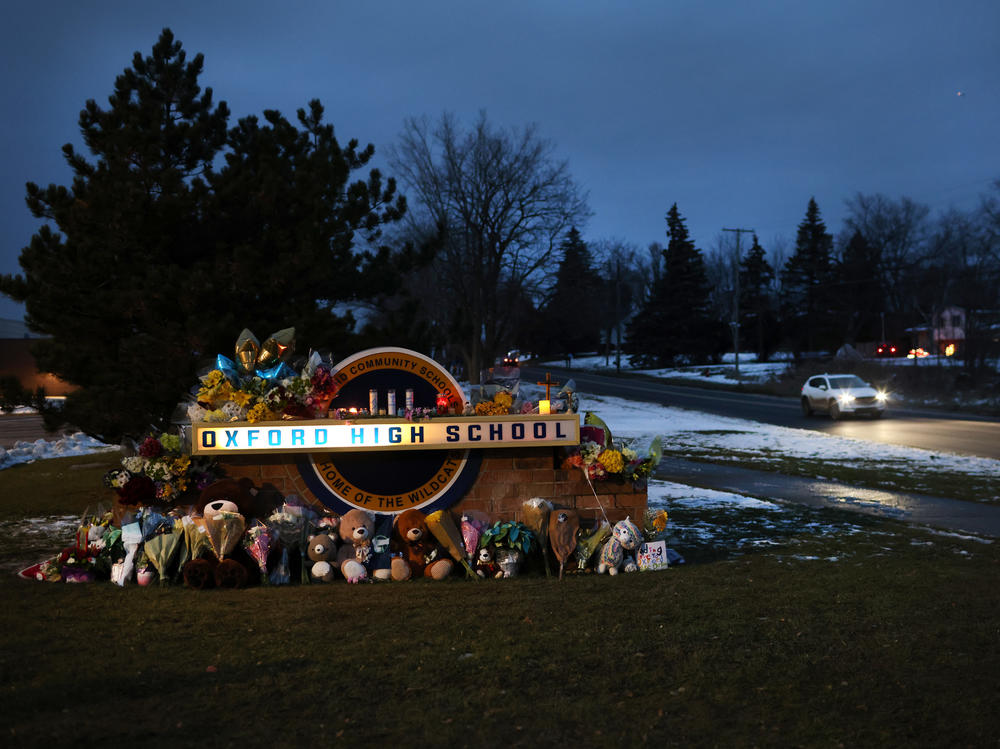Section Branding
Header Content
Oxford shooting victim's family files $100 million suit, saying the school failed her
Primary Content
The family of Riley Franz, a student who was shot in the neck at Oxford High School last week, is suing the school district and school officials in Oxford, Mich., for $100 million, saying they failed to prevent the mass shooting that killed four students and injured seven people, despite multiple warnings and signs for concern.
The federal lawsuit, filed on Thursday by attorney Geoffrey Fieger, accuses school officials of dismissing violent threats — not only in the hours and days immediately before Ethan Crumbley's shooting rampage, but also two weeks earlier, when students and parents raised their concerns. A second $100 million lawsuit will also be filed in state court, Fieger said.
Riley Franz, 17, is a senior at the high school. Her sister Bella, 14, is a freshman. The lawsuit says the two were together when Riley and other students were shot.
The girls had been in a bathroom and were shot at as they emerged, "like they were in a war zone," Fieger said.
In the days since, both girls have suffered from anxiety and post-traumatic stress disorder, along with physical and/or emotional injuries, according to the lawsuit.
In the lawsuit's timeline, school officials were alerted to the potential for violence in the middle of November, when "multiple concerned parents provided communications" to Oxford Principal Steven Wolf about threats to students on social media.
"I know it's been investigated but my kid doesn't feel safe at school," one parent told Wolf on Nov. 16, according to the suit. "He didn't even want to go back to school today."
Replying to parents on the same day, the lawsuit says, Wolf wrote, "I know I'm being redundant here, but there is absolutely no threat at the HS ... large assumptions were made from a few social media posts, then the assumptions evolved into exaggerated rumors."
After those exchanges, district superintendent Timothy Throne used a loudspeaker at Oxford High School to deliver a message to students in which he warned them "to stop spreading information over social media and to stop relying on information on social media, reiterating that there were no threats that posed any danger to students at Oxford High School," the suit states.
Days before the Nov. 30 attack, Crumbley "acted in such a way that would lead a reasonable observer to know and/or believe that he was planning to cause great bodily harm," the lawsuit states. It accuses school officials of increasing the danger to students, for example, by allowing Crumbley to stay at the school and repeatedly failing to inform the school safety liaison officer about Crumbley's behavior and excluding him from a meeting with Crumbley's parents.
In the days leading up to the shooting, the suit says, Crumbley "posted countdowns and threats of bodily harm, including death, on his social media accounts, warning of violent tendencies and murderous ideology prior to actually coming to school with the handgun and ammunition to perpetuate the slaughter."
The night before the shooting, for instance, Crumbley said on Twitter, "Now I am become Death, the destroyer of worlds. See you tomorrow Oxford."
The suit also notes, "Ethan Crumbley's Instagram and other social media accounts were not set to private and were available to the public," adding that his mother's post about her son's new gun were also public.
In addition to the federal lawsuit, Fieger said on Thursday that he's preparing to file a similar suit in state court, which will also seek $100 million.
By naming a high price in the suit, he said, his goal is "to compel people to do something" to prevent school shootings, saying that a sense of moral responsibility has not prevailed in the years since the 1999 Columbine shooting in Colorado. Fieger also represented a victim's family in that school shooting.
Defendants in the federal suit include Throne and Wolf. It also targets two teachers, two counselors and a staff member, although it does not identify them by name.
Saying that their "conduct was outrageous and shocks the conscience," the suit argues that the officials should not be protected by governmental or qualified immunity.
A version of this story originally appeared in the Morning Edition live blog.
Copyright 2021 NPR. To see more, visit https://www.npr.org.

